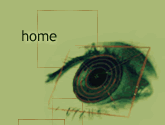|
|
|
|
|
|
|
|
|

|
|
||||||
|
|
|
||||||
|
|
|
|
|||||
|
|
|
||||||
|
|
|
||||||
|
|
|
||||||

|
|
||||||
|
|
|
||||||
|
|
|
||||||
|
|
|
||||||
|
|
|
|
|||||
|
|
|
|
|||||
|
|
|
|
|||||
|
|
|
|
|
||||
|
|
|
||||||

|
Michael: That's part of what I meant. But to be honest, without much conscious thought I've been harboring a glib little psychological theory that goes something like this: Losing your vision must make you feel a general loss of control over your life; understanding the physiology of how that came about might help restore some sense of control. I don't mean to reduce all of your fascination with the beauty and elegance and complexity of nature to pathological compensation, but, well, is there anything to it? |
||
|
Joel: That's not at all glib. Being struck with the statistically rare genetic defect or defects that cause retinal degeneration, and losing my visual grasp of the world, is a continual, frightening confrontation with chaos. My interest about the particular pathology certainly sprang from a need to feel some kind of psychological mastery over the chaos, even if medical control was impossible. And my appreciation of the general biological world opened out from there: the clinical stories of neurologist Oliver Sacks, the Human Genome Project, the discovery of deep-water marine creatures whose entire body surfaces are their eyes, the versatile potentialities of stem cells, the myriad pathways of evolutionary development. None of which might have grabbed my attention before, and all of which now provides for me no less than a new window on life. Of course, I could have paid attention before, but didn't. So it goes. |
||
|
||
| Michael: What is your understanding of the current state of research on retinal degeneration? Do they know what genes are involved? Is there much promise of a medical cure, or of a mechanical device that would replace a defective retina, in our lifetime? | ||
| Joel: The active research is running in several complementary directions. The genetic research has so far identified only the first few of the many genes that are thought to cause the numerous forms of retinal degeneration collectively known as RP. The hope, of course, is early diagnosis and prevention, or cure by way of gene therapy techniques already in use. Surgical transplantation of retinas seems to hold little promise, as hooking up the retina's millions of photoreceptor cells to the optic nerve is like trying to hotwire a car with an ignition system as complex as the Universe. On the prosthetic side, there are implanted microchips with mini camera image feeds under development, as well as other ideas for artificially stimulating or approximating vision. Much of this is promising, but I wouldn't dare to predict outcomes. Too many variables. |
|
|
|
|
|
|
|
|

|
|

|

|

|
|
|
|
|
|
|||||
|
|
|

